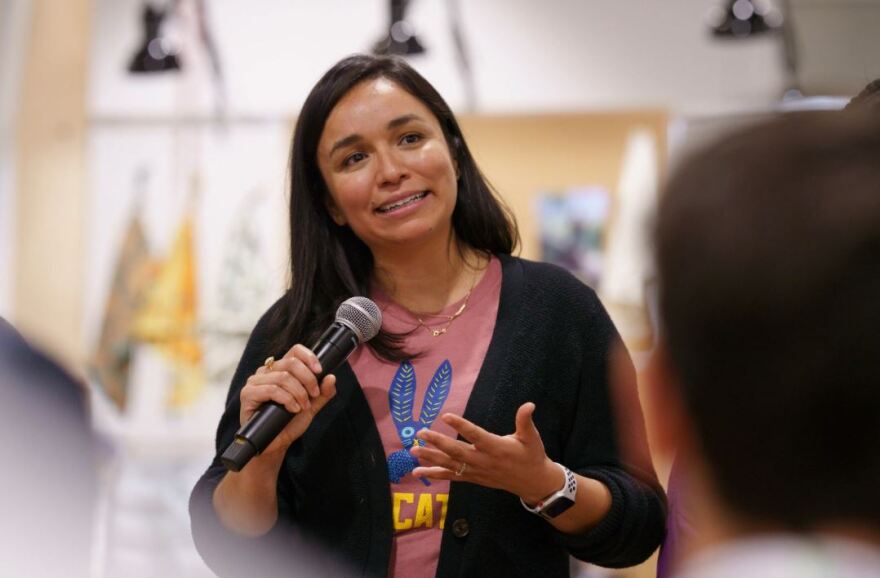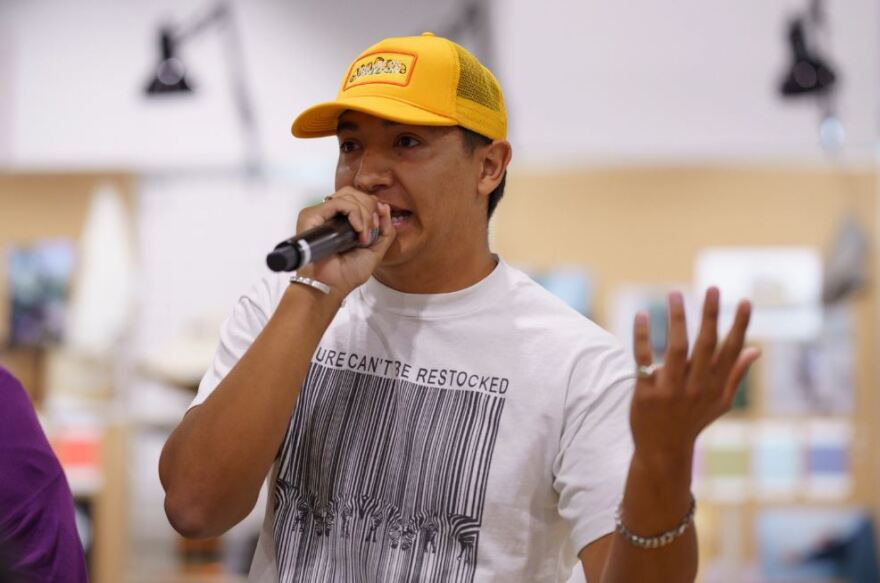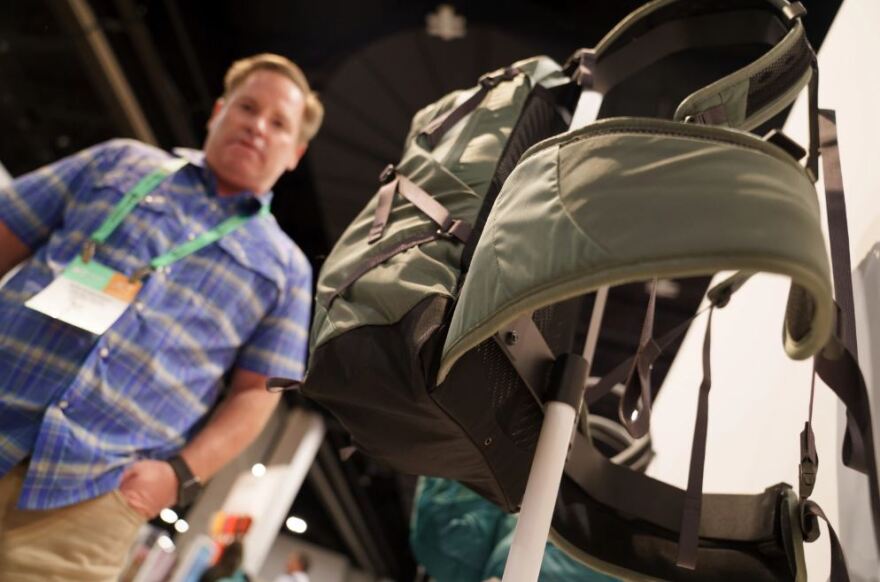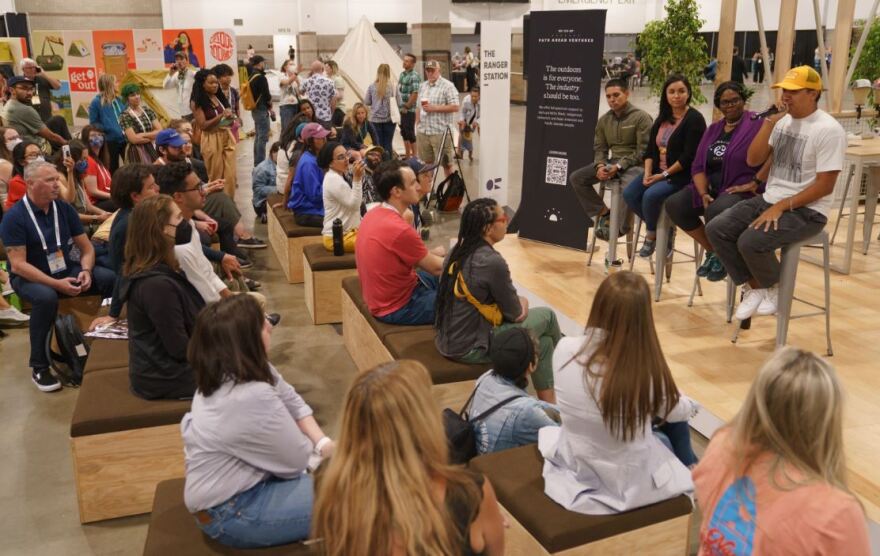This story was originally published in The Colorado Sun.
Michael Mojica was up for anything, so when a neighbor asked if he wanted to climb a 14er, a surefire induction for any new Colorado resident, he agreed to it.
“Sure,” the transplanted Texan replied. “What’s a 14er?”
A few days later, Mojica topped out on the summit of Mount Yale. His eyes blurred with tears, exhaustion and the wonder of the world before him.
“I remember thinking, ‘Why am I getting so emotional about this?’” he said.
The outdoors can be a magical place, even life-changing. Mojica, for example, started his own outdoor gear company, Outdoor Element of Englewood, after his first 14er. There’s a mountain of evidence that human beings need time outdoors to recharge their mental health. That was probably more apparent than ever during the pandemic, when record numbers crammed trails, camping spots and pushed land managers to install reservation systems for something as simple as a day visit.
But Mojica’s mission runs deeper: He designs gear, he said, to give anyone the confidence to venture out like he did. And he means anyone. In fact, he wants that badly.
Most others on Yale that day didn’t look like him. Mojica’s Native American name, Bodaway, means “fire maker,” and he knows he dodged many of the obstacles blocking other paths to the outdoors. He made a good living as a mechanical engineer, he was eager for the experience, and a neighbor made him feel welcome. He hopes his gear, his energy and encouragement and a touch of activism, make others feel like they belong, too.

More than ever, the outdoor industry acknowledges that there’s a large — and growing — population that doesn’t feel included, and it’s a diverse group of all colors, sizes and challenges. This may seem hard to believe, if you’ve ever spent a winter morning parked on Interstate 70, squeezed past flocks of people on the summit of a 14er or tried to reserve a spot for Rocky Mountain National Park, but not everyone feels welcome in the outdoors.
The Outdoor Retailer trade show in Denver, the largest in the country, explored inclusivity during the three days it was in town, June 9-11, probably more than any other subject besides sustainability.
There are many challenges, and that’s because the group includes minorities as well as plus-size people (mostly women), those with disabilities, people with chronic illnesses and those in lower-income families. The LBGTQ+ community sometimes feels out of place, too.

Yet there are also possible solutions, and many of them are created by those inspired by their own experiences. Mojica sat on a panel with three other minority entrepreneurs, including Martha Y. Diaz, who in July will launch Itacate Foods, a line of Latin backpacking food. Diaz has been through rough times, like many of us recently, but she had the outdoors to help her. She said she has enjoyed the backcountry since she was 10, after her family migrated from Mexico.
“I can’t imagine going through some of the things I’ve been through, and not had the outdoors to help me through them,” she said.
But the industry really is just getting started in opening doors, and it’s an emotional journey. Many, including Mojica, cried when recounting their own experiences.
“There’s an extra burden,” said Dan Kihanya, director of REI Co-op’s Path Ahead Ventures, “when you represent an underrepresented group.”
Few familiar faces
It’s hard enough to venture out when you feel out of place. Just think about how awkward you feel at a happy hour mixer when you don’t know anyone.
“When we see someone who looks like us,” said Luis Villa of Latino Outdoors, a nonprofit based in Oakland, California, with a chapter in Colorado, “it gives us permission to be there.”
But many say the outdoors isn’t as full of shiny, happy people as the glowing models in photographs plastered all over the trade show lead you to believe. Others — many refer to them as “gatekeepers” — make them feel unwelcome, even judged, for being there. In an article written for the Outdoor Retailer magazine, Parker McMullen Bushman, calls these moments of judgment, intentional or not, “microagressions.”
Bushman, a plus-size Black woman who is known to her hundreds of thousands of followers as Kween Werk on social media, preaches “The Outdoors Is For Everyone.” She’s enjoyed outdoor activities for nearly 25 years, and yet people are stunned when she confirms that, yes, she’s the one leading the kayak trip.
“A microaggression can be a subtle comment or action directed toward someone from a marginalized community that can be intentionally or unintentionally harmful,” Bushman wrote. “Microaggressions can range from brief comments to subtle insults delivered through dismissive looks, gestures and tones.”

Chantelle Shoaee sees them all the time during her hikes. She is the executive director of Always Choose Adventures in Colorado, which works to increase opportunities in the outdoors with efforts such as a gear library that lets anyone borrow expensive equipment free of charge. She also has a chronic condition that causes her airway to collapse, forcing her to use an oxygen tank during physical activity or at higher elevations. The unintentional jokes hurt just as much as those who ask if she’s hurting herself by hiking.
“They make jokes, like, ‘I can’t breathe either, can I have some of that?’” Shoaee said of her oxygen tank.
Chronically ill people need the outdoors, she said, because they typically are depressed — she would know — and struggle just to leave the house.
“They have no hope,” she said. “They need to feel the sun on their face.”
In response, she’s working with Osprey, a Colorado company that makes packs of all shapes, to design a backpack made for carrying oxygen bottles. She also wants to design nose cannulas with different colors so they blend with all types of skin color. (Osprey considers inclusiveness a part of its mission: This year it donated $5,000 to the Venture Out Project ,an LBGTQ+ organization, and supported Full Circle, the first all-Black team of climbers on Everest, which included two Colorado residents).
Cassie Castillo of Latino Outdoors has lived in Wyoming for two years and still doesn’t feel welcome at Snowy Range ski resort, even with its relative lack of ostentation. She admits she looks at snow funny — she lived most of her life in Southern California — and she rents her ski gear, but doesn’t appreciate the looks of doubt from other skiers because of her brown skin.
“I still don’t feel like I belong,” she said.

Even established industry figures sometimes don’t feel welcome. Kareemah Batts founded Adaptive Climbing Group, an expansive organization that provides climbing opportunities to those with disabilities of all kinds, physical or otherwise. She sponsors 16 professional climbers and has nine chapters with 27 program leaders. She’s well known, which means some will ensure that she feels welcome when she’s climbing. Yet others still assume she isn’t the founder, or a top climber herself, because she’s a plus-size Black woman who lost a leg to cancer.
“I have my moments every year at a new place,” Batts said. “It’s what I look like as opposed to what I know.”
Kindra Roberts, a white plus-size woman, came out every year to Colorado to ski, something she’d done since she was 3, but after she gained a significant amount of weight in 2017, others on the slopes made her feel self-conscious.
“When they look at my size, they just stare at me, until I start skiing,” Roberts said, “and then they say, ‘Holy shit, she’s a really good skier.’”
Your biggest insecurity, emphasized
Roberts started her online clothing company, AlpineCurves, in 2017 after she couldn’t find ski clothes that fit. She had to special order men’s clothing. Her friend, she said, had brand-new, cute pink clothes, and she had to wear a “gross” black-and-blue snowsuit that made her feel dumpy.
“Imagine your biggest insecurity,” Roberts said, “and then having to wear something that makes you feel even more self conscious about it.”
When she went to the Outdoor Industry show in 2018, eager to present her idea to designers and companies, she was told “they didn’t want someone like me representing their brand.”
“It was horrible,” she said. “I felt like a fish out of water.”
This year, Outdoor Retailer honored Roberts in its Inspiration Awards, which she downplayed: Yes, companies are improving — as an example, Columbia goes up to 3X large now, she said — but she would never walk into REI, as she knows nothing would fit her. And even if clothes fit her now, kayaks and other pieces of equipment may not. But now she doesn’t get hurt by these oversights.
The industry, she said, ignores people like her at their own risk: More than 65% of all women are size 14 or above.
“That’s billions of dollars,” Roberts said. “They have money to spend, and they are just being ignored.”

They won’t go to store managers and demand plus sizes, either, Roberts said, because they’re embarrassed. But some places are getting the message. At the show, Osprey showed off its brand-new line of backpacks called Extended Fit, which can accommodate hips up to 70 inches (Roberts didn’t know about the new line but said 70 inches was “really good”).
Osprey didn’t anticipate big sales for the new line, said Blair Volpe, who works in sales for Osprey and was managing the booth at the show.
“But I didn’t realize how many full-sized people there are,” Volpe said, “and there’s just no gear for them. We don’t want the barrier to the outdoors being gear.”

No one called the company asking for the new line. But since news of Extended Fit broke — the line will launch in spring 2023 — Osprey has had many calls from people thanking them for making the new backpacks. This suggests that the demand will be higher than anticipated.
More outdoor companies could stand to be forward-thinking about what they offer, even if customers don’t ask for them. “Once you make it, you take away that barrier,” Volpe said. “It’s just a really neat idea.”
Well, if you can afford it. The cost of the outdoors remains a significant barrier, say many advocacy groups working to smash it.
Cheap but maybe not affordable
Andy Hartman didn’t get into the outdoors until he was in his late 20s, when he traveled the world and stumbled across New Zealand’s “Lord of the Rings” scenery. He became a guide and now is executive director of New Treks, a Denver nonprofit that takes students, mostly minorities, in Denver Public Schools and from a homeless shelter, on backpacking trips.
Getting to those places is always an issue for families, a trip that requires a personal car most of the time. This alone means many Denver public students won’t see the mountains up close in their childhood. Their parents, many times, haven’t seen them either and don’t see the point, Hartman said, telling their kids they should be working instead.
“They have the wonder for it,” Hartman said. “You just have to light the flame.”
Clothes and gear can cost, at minimum, $300 for a simple hiking trip, and that’s with big-box department stores such as Walmart and Target offering relatively low-cost options, Hartman said. (He takes kids to Target to get their gear). Gear featured at REI — or, quite frankly, by many of the brands at Outdoor Retailer’s show — can be too expensive even for middle-class workers, and so can ski passes, travel and gas prices.
Hartman had to adjust his way of thinking about urban kids and introducing them to the outdoors. He prefers to stay unplugged during his adventures, but watching the kids record and post about the outdoors on their phone told him they were engaged. Some hadn’t seen a chipmunk before.
“One of the kids wrote a rap song about rock climbing,” Hartman said. “He’s asking when he can go back.”
Minority groups don’t want to stereotype, but many minority families still face lower incomes, said Villa of Latino Outdoors, and simply won’t spend hard-earned money to, say, go trekking in the Grand Canyon. So it helps to broaden the perspective of what can constitute an outdoors trip: Latinos spend time at picnics with their families, play a lot of “fútbol” or will walk parks with their kids, said Vanessa Herrera with Latino Outdoors.
“We spent time outdoors,” she said. “We just don’t call it ‘hiking.’”
If this seems like simple syntax, it’s much more than that, Herrera said. Thinking about the outdoors in broader terms could encourage cities to develop more parks near Latino neighborhoods. Greeley, for instance, developed a park with trails, natural tree limbs and a concrete slide in an area on the east side of town, where many Latino and refugee families live.

The terminology Herrera uses could also reassure those uncomfortable in the outdoors that they, in fact, do have the skills to be safe outside and that hiking, hunting or fishing at a nearby state park or wilderness area may not be outside their comfort zone.
“It’s about the framing of all of it,” Herrera said. “We want to see ourselves as a part of the conversation.”
The conversation should start with those who don’t feel welcome, said Batts of Adaptive Climbing, and that includes clients of the organization trying to open doors.
“You can’t have these experiences be manufactured,” she said. “I create a chapter and provide a canvass, but (the program leaders) know what their community wants. The population isn’t the same in each area. People are always asking me how you did this and that, and people just forget to talk to the people.”
Many barriers remain, and how people feel about their outdoors experience may simply depend on where they live. We’re still discovering how different states can differ politically, but those with disabilities find different access, for better or worse, even in different counties, Batts said.
“ADA is a federal law, but it’s very vague, and people do what they want with it,” she said. “People make people feel welcome, not laws.”
When the conversation changes, it begins to include people such as the Black climbers who scaled Everest, the world’s tallest mountain. The team included Thomas Moore, a Black mountaineer, and Eddie Taylor, a teacher and track coach at Centaurus High School in Lafayette. Black mountaineers are so rare, especially those on big, expensive expeditions, that when multiple members of the team made the top, they doubled the number of Black climbers who had summited Everest.
“Maybe we’ve helped people think about Everest in a new way,” Taylor said earlier to Colorado Sun, “and maybe what the face of mountaineering should look like.”
Changing the narrative changes what’s possible, in other words, even for the many entrepreneurs trying to do just that for people like them as well as themselves.
Mojica is thankful for the opportunity he’s had from mentors and small moments to get this brand out there, such as sitting on the Outdoor Industry panel sponsored by REI Co-op’s Path Ahead Ventures, which launched in October 2021 and invests $30 million in 300 founders of color to start and scale businesses. It reminds him of the day he climbed his first 14er and saw what was possible in the expansive landscape before him. He now has 10 patents on his products and three trademarks. Things look good.
“These programs give us just a little bit of a lift,” Mojica said. “When people are excited at what we are doing, it gives me the energy I need to keep going.”






